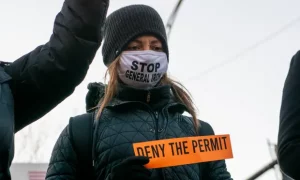by Taylor Moore / The Guardian

A climate activist protests the relocation of General Iron, a metal scrapping company, from an affluent neighborhood on the city’s North side to the city’s Southeast. Photograph: Dominic Gwinn/Zuma Wire/Rex/Shutterstock
A year after a hunger strike brought national attention to a potentially toxic metal shredder in a majority Latino neighborhood in Chicago, the city has announced it will not issue the final permit necessary for the plant to open, calling it an “unacceptable risk”.
“In an already vulnerable community, the findings from the [city’s health impact assessment] combined with the inherent risks of recycling operations and concerns about the company’s past and potential noncompliance are too significant to ignore,” said the Chicago department of public health commissioner, Allison Arwady, in a press release.
The news came late on Friday. Southside Recycling is a metal recycling facility that – with the controversial approval of Mayor Lori Lightfoot – would have processed 2bn pounds of scrap metal a year in the working-class East Side neighborhood, which has been besieged by industrial pollution for more than a century. Its owner, Reserve Management Group (RMG), has a history of violating emissions standards set by the Illinois EPA.
RMG has vowed to pursue a lawsuit against the city for the permit denial, according to a statement. “Politics, not environmental or public health protection, is the only reason that the city denied Southside Recycling’s permit to operate.”
The decision was a huge win for activists and residents who, last year, went without food for one month to show how serious they were about getting Southside Recycling out of their neighborhood.
When activist Gina Ramirez heard the news, she was speechless. “This is a testament to the love and pride we have for the Southeast Side,” she said.
The city’s decision came just days after the Chicago department of public health presented the results of its health impact assessment.
With help from the US Environmental Protection Agency, the city concluded that Southside Recycling would have a “negative impact” on air pollution and mental health and would further concentrate undesirable industry in the area. The one hundred jobs the facility would create were considered a “positive impact”.
It also said that the site would have no substantial effect on cancer and chronic illnesses – such as COPD, asthma and heart disease – though the city acknowledged that the “status quo” for the Southeast Side already represented poor health compared with other areas of the city.
Similarly, an air emissions study by city contractor Tetra Tech said the estimated health risks for cancer and chronic illness fell in a safe range, below the EPA’s threshold for acceptable risk.
Public health experts were disappointed by a lack of transparency in how the city of Chicago arrived at its results. Dr Serap Erdal, an environmental health professor at the University of Illinois-Chicago, called the air emissions presentation a “black box”.
Residents, activists and environmental experts have railed against Lightfoot and the city for allowing RMG to close a metal shredder on the city’s affluent North Side and reopen another in an area with poor air quality.
Lightfoot delayed the permitting process in May 2021 at the request of the EPA administrator, Michael Regan, who asked for the city to consider the health effects on an already overburdened population.
“This is what environmental justice looks like,” Regan said in a tweet responding to the permit denial on Friday.
Activists say the city’s decision to deny the plant’s final permits represents a departure of policies that have left Chicago’s Southeast Side dealing with more air pollution than its residents produce.
Óscar Sánchez, co-founder of the Southeast Youth Alliance who embarked on the hunger strike last year, called the permit denial “a symbol for what is to come”. Many communities across the city are still working to correct longstanding environmental injustices, he said, but today “we get to breathe”.
